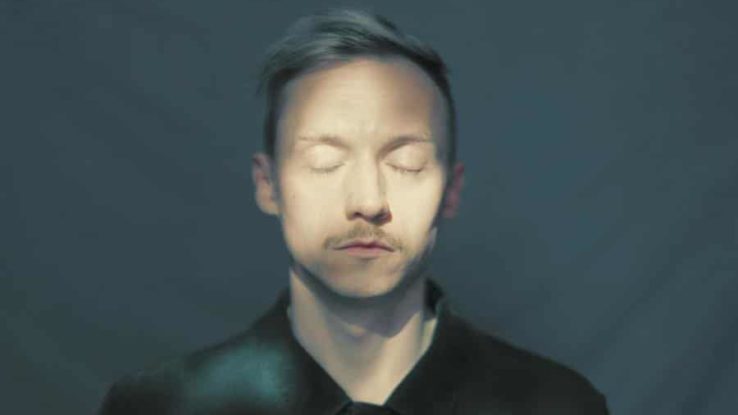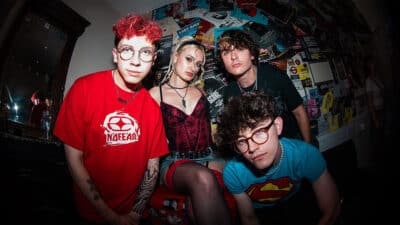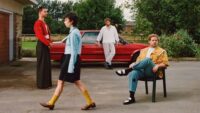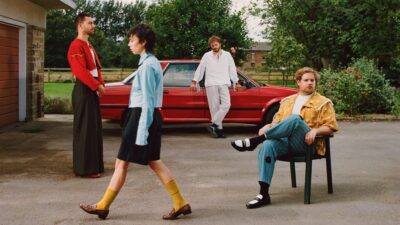Interview

Interview
Hamish Hawk: “The strength of the music is that it maybe doesn’t quite fit in”
The Edinburgh artist talks new album Angel Numbers, impostor syndrome and escaping the expectations attached to his name
“To write a cathedral, I’ll need a ball-point pen,” decides Edinburgh’s Hamish Hawk on last year’s Heavy Elevator, “It’ll sound like ‘Common People’ sung by Christopher Wren.” The lines open ‘The Mauritian Badminton Doubles Champion, 1973’ — an obscure title for a song about the universal concern for building a life to be remembered by, something the 30-year-old has certainly been doing with his ball-point pen over the last few years.
February sees the release of Hawk’s fourth album, Angel Numbers, which he hopes will follow in the path of 2021’s Heavy Elevator, which was shortlisted for this year’s Scottish Album of the Year Awards. We sat down with the songwriter ahead of its release and a UK tour in the new year.
Last year’s Heavy Elevator felt like a turning point for you, a moment of particular accomplishment, is that how you saw it? Where did you go from there to begin working on Angel Numbers?
Heavy Elevator really was a turning point. It was the product of several years songwriting, so when we finally got to record it did feel… not a weight off our shoulders exactly, but it did feel like an achievement, even in the studio. It felt like we’d come up with something quite comprehensive, an all-encompassing thing.
But with Angel Numbers, the songs came from a much shorter period of time, which was the lockdown period. It’s a funny thing with that second album syndrome as it were, because you’re aware that you’re recording or writing an album in the wake of a moderately successful album. It was certainly the first time I’d done that. You’re aware of following something up, and as far as keeping people satisfied or being true to what your sound is, you’re aware of wanting to follow suit or follow up the album properly, but also wanting to diversify it in places as well, to keep things interesting.
Angel Numbers isn’t more of the same, necessarily, but I don’t think fans of Heavy Elevator will be disappointed. I think it is a continuation, and I see it as something of a sister record. It’s softer and more contemplative. Slower, I would say. There’s slightly bigger production; there’s brass and strings and pedal steel, which was very exciting.
Talk to me about your relationship with words, with writing lyrics – something that seems to play the main role in your music. How has your craft developed?
Well I started writing songs in my teens. Not songs I would want to show anybody now I’m sure. To be quite honest, it took me a long time to recognise that note taking, or making little notes of phrases or idioms or observations in a notebook or on your phone isn’t something that everybody did. You know? I’ve spoken about this before, but it’s just the way of being a writer or an artist of any kind, I think there’s a teething period where you feel like you’re not a fraud exactly, but maybe a bit of a poser or impostor. You do feel like most people have this string to their bow.
The worry that you’re not a writer or an artist unless you’ve achieved something?
Yeah, well exactly that. It’s funny because for me, after I’d had my first record and then an EP after that and then another record, then another record, I was still not mentioning that I did music when I was introduced to people. That wasn’t necessarily the first thing I said. Oddly enough for me, it was when other people, friends of mine, started introducing me to others as a songwriter. “This is Hamish, he’s a singer.” So I thought, okay, well other people are saying it, so maybe it’s okay if I start saying that too.
I always did write lyrics. It was never poetry I don’t think, and I didn’t tend to write much long-form prose or anything like that. It was always songs, and I knew that was where they were going to end up. The practice has stayed with me, and more often than not it feels less of a practice and more of a compulsion; it’s something that I do without thinking. It’s the first thing I do, in that everything else follows that. If I’m busy, I’ll always find a way to squeeze in writing, it’s the thing that takes precedence over everything else. But in terms of technique I’m a fierce perfectionist; I’ll take a long, long time to shave off the excess and edit and edit and edit to really bring it right down to its bare essentials, as I see them. It’s a long winded process, but that’s the way I like it.
Have there been times when you put the music behind a set of lyrics and then just feel the tone isn’t right, or do you try not overthink the connection?
It’s funny you should say that because I’m currently working on a song that I’m not quite certain what backdrop will benefit it most. There’re lots of different ways we’ll write. Sometimes I’ll sit at home with a guitar or on the keys and the music and lyrics will come at the same time. Other times Stefan my drummer or Andrew my guitarist will send me a blank demo and I can just sit with it for a while. But other times I write without any music at all.
In terms of thinking about music to benefit the song, it really is just a feeling. Sometimes we can write something on the guitar or piano and I like it, but it just doesn’t do it. Andrew especially has said to me before how aware he is of that period of listening to it: if it doesn’t catch then we might as well move on. It needs to be short for it to feel exciting, you don’t want to overthink it too much.
The new album features a few guests, tell me a little more about how those came about?
The vocals from Samantha Crain and Anna B Savage both came about exactly the same way. I was performing with Samantha at Summer Hall here in Edinburgh, we were doing a joint headline slot and we got chatting and then kept in touch. The same for Anna, at exactly the same venue. We were both playing a festival and I was on before her – we got chatting and then continued the conversation on social media. I later saw Anna at South By South West, and we spent the afternoon together, which was really fruitful in terms of just finding a kindred musical spirit. She’s said the same to me since, that we had this lovely walk and it felt like we saw eye-to-eye on quite a lot of things. So I didn’t hesitate to ask her, because I admired her so much, and exactly the same for Sam. They both said yes, so it was worth asking.
Your track with Samantha Crain, ‘Rest and Veneers’ feels the most influenced by Americana. Tell me about your relationship with the States.
That was the last song to be written and added to the album. I don’t have a connection to America in terms of family ties, but I have been to America several times and I make no secret of the fact that it’s been incredibly inspiring every time I’ve been, it’s been a real purple patch for me writing wise. I think there’s a huge number of reasons why, but as a writer, the completely different vernacular and verbal palate just gets my juices flowing. It’s as simple as things being called different names. My notebooks are full every time I come back from America, and I need to be quite conscious of the fact of not turning them into big highway ballads. You do hear lots of British bands going over to America and having suddenly this suspiciously American record.
And this is a wider point, but being called Hamish Hawk and having grown up in the Scottish music scene… it’s not that I’ve been pigeonholed, and certainly no one’s to blame, but every so often there’s a certain kind of expectation that people have of a singer called Hamish Hawk. There’re certain things people might expect me to sing about. I’ve said this before, but I always fear a degree of parochiality. I don’t know if it’s an undue concern, but early on I was conscious of bringing in influence from wherever I could get it. I think I’ve been successful in not only the phrasing but also the references and worldview of the music.
Yeah, you’re an artist from Edinburgh who still lives there and in many ways your professional development was carved by the city. A lot of the music press seem to mythologise scenes that aren’t from London, I don’t know if you’ve experienced that?
I’m aware of it, certainly. But it’s so easy to mythologise Edinburgh! [laughs]. I’ve lived here all my life and it’s mystical! I fight shy of saying the word proud because that encompasses something else, but I’m really happy to live in Edinburgh, and I’m really thrilled to have been brought up here. Just like any other small city with a big town feel, every so often I’ll have a desire to break out, but more often than not it’s a lovely place to come back to, wherever you’ve been. I’m certainly aware of the shortbread tin image of Edinburgh, but when you live here, what with the festivals going on and generally how busy it is most of the year, it is an outward looking place.
I have to say, I don’t think it’s just the fault of English writers, I think Scottish writers are just as bad. It’s such an odd-looking city, and when I say odd I mean unique. You’re quite spoiled walking around Edinburgh, and if you work in retail or tourism as I have… pretty much all of my jobs I’ve had here have been customer-facing, tourism industry jobs, so I’ve always had this idea of people visiting. I suppose from that I’m quite interested in the outsider’s view of Edinburgh and what it is that people see in it. But it’s very similar to what I see in it, to be honest, it’s a cool place.
You’ve said the lead single ‘Angel Numbers’ is a “Look at the sacrifices we all make in order to feel we belong”. Did you find yourselves making sacrifices as an artist in recent years? Do you still?
What’s happened since Heavy Elevator has been such a privilege to behold. Honestly, it’s been a real whirlwind to be part of, but it is really exciting. All five singles we’ve released from Heavy Elevator and Angel Numbers have been playlisted at BBC 6 Music, and the immense response that we’ve had live is properly life-affirming. But it’s a funny thing. I think we all, as avid listeners of new music, can bunch artists together in different strands or trends or new songs and things like that. I am very aware that as much as when I listen to my music I struggle to hear anything other than just me, I’m self-aware enough to know it’s quite unique. I get lots of comparisons but they tend not to be bedfellows or contemporaries, they tend to be from way back, which is great. And a lot of the comparisons I get I’m very happy with. But I don’t think I’m making sacrifices to fit in – I feel oddly enough that the strength of the music is that it maybe doesn’t quite fit in. Fitting in with the wealth of new music coming out every moment of every day might also be not standing out. So if I can stand out, even if it means I stand out on my own, I think that’s a good thing.
More than ever, I’m able to put forward who I am and feel good about it.
Hamish Hawk plays Edinburgh on New Year’s Day before embarking on a headline tour throughout February – tickets are available here.
Angel Numbers is released 3 February 2023, stream latest single ‘Think Of Us Kissing’ here.









